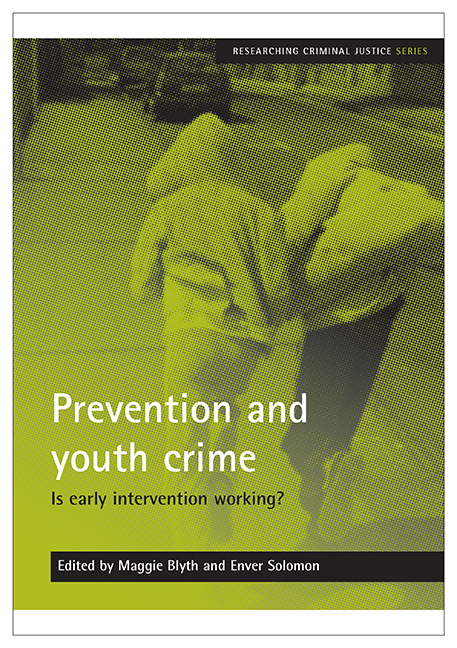Book contents
- Frontmatter
- Contents
- Foreword
- Acknowledgements
- List of abbreviations
- Notes on contributors
- Introduction
- 1 Integrated or targeted youth support services: an essay on ‘prevention’
- 2 Intervening in gang-affected neighbourhoods
- 3 Family intervention projects and the efficacy of parenting interventions
- 4 Early intervention and prevention: lessons from the Sure Start programme
- 5 Attachment research and the origins of violence: a story of damaged brains and damaged minds
- 6 Early intervention in the youth justice sphere: a knowledge-based critique
- 7 European perspectives on prevention
- Conclusion
Foreword
Published online by Cambridge University Press: 25 March 2023
- Frontmatter
- Contents
- Foreword
- Acknowledgements
- List of abbreviations
- Notes on contributors
- Introduction
- 1 Integrated or targeted youth support services: an essay on ‘prevention’
- 2 Intervening in gang-affected neighbourhoods
- 3 Family intervention projects and the efficacy of parenting interventions
- 4 Early intervention and prevention: lessons from the Sure Start programme
- 5 Attachment research and the origins of violence: a story of damaged brains and damaged minds
- 6 Early intervention in the youth justice sphere: a knowledge-based critique
- 7 European perspectives on prevention
- Conclusion
Summary
The Association of Directors of Children's Services (ADCS) is the leadership organisation for children and young people's services. Members are charged with ensuring localities’ cooperation to achieve the Every Child Matters outcomes. This ‘duty to cooperate’ covers statutory agencies: health, police, probation, services for young offenders, Learning and Skills Councils and local authorities. We expect that by 2009 it will include schools and colleges. ADCS works with government departments, from the Department for Children, Schools and Families and the Department for Innovation, Universities and Skills to the Home Office, the Ministry of Justice and Cabinet Office, to influence policy.
At the seminar from which this report has resulted, I made many of the points in its chapters: about the balance between early intervention, risk, and the potential for the public denigration of children and young people who offend through an enhanced focus on them as a group. I reflected on how far local authorities should bear the costs of incarceration. I was clear that we would welcome this shift of accountabilities if it came with both the resources currently expended and an expectation that we would use them differently.
Most directors of children's services (DCSs) are responsible for services for youth justice services, and at the same time for the universal and targeted services through which children and young people who offend may pass: schools, youth services and others. Holding all these strands together places DCSs in a unique position: we see what a young person lives with, and through, from every angle.
ADCS welcomed the government's Youth Crime Action Plan and its positive emphasis on early intervention and integrated approaches. We stressed the need to persevere with early intervention and to build on existing best practice. We urged a mandatory link between children's trusts and all youth justice services; a greater focus on positive publicity, for a nation frightened of its own next generation; and the greater involvement of the magistracy and judges in reshaping how we deal with, and how society views, those brought before them.
We are central to the work still to be done, and will continue to be held accountable for its results. This collection is both a timely and valuable contribution to the ongoing dialogue, in which we all need to remain engaged.
- Type
- Chapter
- Information
- Prevention and Youth CrimeIs Early Intervention Working?, pp. ivPublisher: Bristol University PressPrint publication year: 2008



